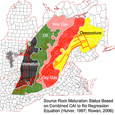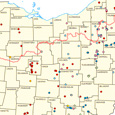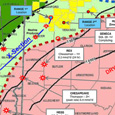Analysis of Wastewater Yields Surprises
Tuesday, January 22, 2013
According to Phys.org, hydraulically fractured natural gas wells produce less wastewater per unit of gas than conventional wells. But, the scale of fracking in the Marcellus shale region may overwhelm the region’s wastewater disposal plants.
This information comes from a press release by EurekAlert!
The analysis was done by researchers at Duke and Kent State universities:
“We found that on average, shale gas wells produced about 10 times the amount of wastewater as conventional wells, but they also produced about 30 times more natural gas,” said Brian Lutz, assistant professor of biogeochemistry at Kent State, who led the analysis while he was a postdoctoral research associate at Duke. “That surprised us, given the popular perception that hydraulic fracturing creates disproportionate amounts of wastewater.”
Though fracturing gas wells produce less wastewater, the total amount of wastewater has skyrocketed by 570 percent since 2004.
The increase is a direct result of the increased natural gas production in Pennsylvania and Ohio.





This doesn’t justify itself. Look at the net use of water and the net creation of waste along with how much toxic “water” is left underneath in the long laterals to eventually migrate to contaminate even more water. It’s not worth it.